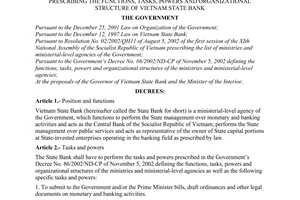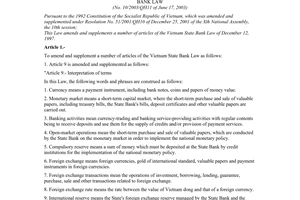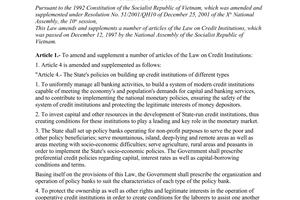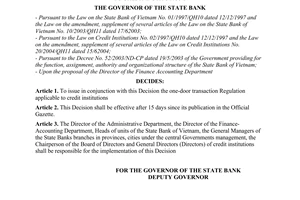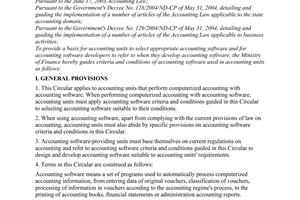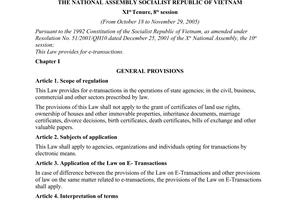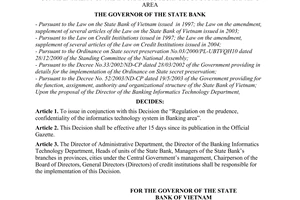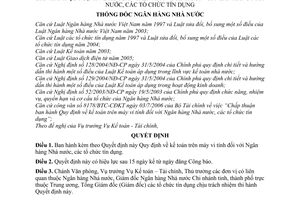Nội dung toàn văn Decision No. 32/2006/QD-NHNN of July 19, 2006, on the issuance of the regulation on computer accounting applicable to the State Bank, Credit Institutions
|
THE
STATE BANK OF VIETNAM |
SOCIALIST
REPUBLIC OF VIETNAM |
|
No. 32/2006/QD-NHNN |
Hanoi, July 19, 2006 |
DECISION
ON THE ISSUANCE OF THE REGULATION ON COMPUTER ACCOUNTING APPLICABLE TO THE STATE BANK, CREDIT INSTITUTIONS
THE GOVERNOR OF THE STATE BANK
- Pursuant to the Law on the
State Bank of Vietnam issued in 1997 and the Law on the amendment, supplement
of several articles of the Law on the State Bank of Vietnam issued in 2003;
- Pursuant to the Law on Credit Institutions issued in 1997 and the Law on the
amendment, supplement of several articles of the Law on Credit Institutions
issued in 2004;
- Pursuant to the Law on Accounting issued in 2003;
- Pursuant to the Law on Electronic transaction issued in 2005;
- Pursuant to the Decree No. 128/2004/ND-CP dated 31/5/2004 of the Government
providing in details for and guiding the implementation of several articles of
the Law on Accounting applicable to the state accounting area.
- Pursuant to the Decree No. 129/2004/ND-CP dated 31/5/2004 of the Government
providing in details for and guiding the implementation of several articles of
the Law on Accounting applicable to business activities.
- Pursuant to the Decree No. 52/2003/ND-CP dated 19/5/2003 of the Government
providing for the function, assignment, authority and organizational structure
of the State Bank;
- Pursuant to the Official Dispatch No. 8178/BTC-CDKT dated 03/7/2006 of the
Ministry of Finance on the “Approval for the issuance of the Regulation on the
accounting on computer applicable to the State Bank, Credit Institutions”;
- Upon the proposal of the Director of Finance – Accounting Department,
DECIDES:
Article 1. To issue in conjunction with this Decision the Regulation on computer accounting applicable to the State Bank, credit institutions.
Article 2. This Decision shall be effective after 15 days since its publication on the Official Gazette.
Article 3. Director of Administrative Department, Director of the Finance – Accounting Department, Heads of related units of the State Bank, General Managers of the State Bank branches in provinces, cities under the Central Government’s management, General Director (Director) of credit institutions shall be responsible for the implementation of this Decision.
|
|
FOR
THE GOVERNOR OF THE STATE BANK OF VIETNAM |
REGULATION
ON COMPUTER ACCOUNTING APPLICABLE TO THE STATE BANK, CREDIT
INSTITUTIONS
(Issued in conjunction with the Decision No.32/2006/QD-NHNN dated 19/7/2006
of the Governor of the State Bank)
Chapter I
GENERAL PROVISIONS
Article 1. Governing scope and subjects of application
This Regulation provides for the accounting performance by accounting software on the computer network applicable to the State Bank of Vietnam, credit institutions (hereinafter referred to as Banks) which fully satisfy conditions as provided for in Article 4 of this Regulation.
Article 2. Interpretation
In this Regulation, following terms shall be construed as follows:
1. Computer accounting means Banks use accounting software for the performance of accounting on the computer network.
2. Accounting information system is an information system which is set up for the sending, receipt, archive, display or carrying out other processing for the data in accordance with provisions of the laws on accounting.
3. Automatically accounted transaction is a transaction, which is accounted automatically by accounting software without any external intervention. These transactions are accounted basing on the information created by the information system from available database in the system (calculating the accumulated interest…) or basing on electronic transactions of the customers (ATM transactions…).
4. Operational subsystem means accounting divisions, which are divided on the basis of operational activities of the Banks. These accounting divisions shall be responsible for entry, supervision of data on financial, economic operation; determination of Debit account, Credit account to the accounting information system about transactions of operational activities that they are in charge.
5. Leger account is a general account at the lowest level (at least its contents are similar to those of general accounts of level 3 of the Accounts system issued by the Governor of the SBV) which is stipulated in the accounts system being applied at Banks.
6. Ending time of a working day is the time where a working cycle on the accounting information system ends, and close of daily accounting book has been performed. After that time, there shall not be any economic, financial operation to be dealt with, accounted into the accounting book of the same day, except for transactions concerning the adjustment of error in accordance with applicable provisions.
7. Heads of Banks shall be the Governor of the State Bank, General Directors (Directors) of credit institutions.
8. Heads of local banking units (heads of banking units): are heads of units of the State Bank, credit institutions which have an accounting apparatus and perform accounting on computer (Branch, Operation Department…).
Article 3. Principles of performing accounting on computer
1. The performance of accounting on computer at Banks must comply with provisions of the Law on Accounting and other provisions of related laws.
2. Accounting vouchers using in the computer accounting are paper vouchers or electronic vouchers. The drawing, control, archive of the accounting vouchers shall be implemented in compliance with current provisions on vouchers.
3. General accounting shall only be performed on the basis of the data of detailed accounting. Banks must assure the sufficient, clear supply of the data of general accounting for drawing up financial statements and data of detailed accounting for managing each specific accounting subject.
4. Banks must assure the principle of Debiting first, then Crediting or Debiting and Crediting at the same time for economic, financial operations arising at their units. The Crediting shall only be performed first where the Debiting is surely performed.
5. The computer accounting must be performed in accordance with a closely controlled procedure that is issued by the Head of the Bank.
6. People who are competent to access and use the accounting software must be authenticated and authorized in accordance with applicable provisions for the access to the accounting software and performance of their function. The people who are competent to access and use the accounting software shall only be permitted to perform authorized duties and shall take responsibility for their performed duties. Any illegal access and use of the accounting software shall be strictly prohibited.
7. Data after being officially updated in the accounting information system shall only be readjusted or amended by a competent person and in compliance with the operational procedure. Any illegal access and amendment of data shall be strictly prohibited.
Article 4. Conditions for performing accounting on computer
1. Fully satisfying conditions of material foundation, technique and officer, the accounting software must satisfy standards and conditions in accordance with provisions in the Circular No.103/2005/TT-BTC dated 24/11/2005 of the Ministry of Finance providing guidance on the standards and conditions of accounting software, assuring the sufficient reflection of arising economic operations in accordance with current provisions, assuring the possibility of data inspection, reconciliation between the accounting vouchers and accounting book, data reconciliation among accounting books and data synthesization for drawing up financial statement in accordance with applicable provisions.
2. Availability of system of computers to be connected to an online network for the update, processing, control, exploitation and archive of data on a prudential, accurate, prompt and convenient basis. The computers system must have a common database, a backup information system in accordance with applicable provisions.
3. Availability of an operational-technical procedure of computer accounting. This procedure shall include following major contents:
a. Clear determination of right, obligation and responsibility of each officer relating to the computer accounting
b. Procedure on the circulation of vouchers which are in line with the accounting software, management requirement of each type of operation, at the same time assuring the accuracy of the general accounting, detailed accounting process.
c. A procedure on the inspection, control, approval, reconciliation to know that whether the computer accounting has enough necessary control procedures for a timely detection of all errors that may arise during the accounting process on computer or not.
d. Issuance, management and authentication in accordance with the Regulation on the prudence, confidentiality of the information system in banking area issued in conjunction with the Decision No. 04/2006/QD-NHNN dated 18/1/2006 of the Governor of the State Bank.
dd. Organizing the archive of accounting data on the computers system and organizing the secret protection of accounting data.
4. Local People’s Credit Funds that perform the computer accounting in accordance with this Regulation shall be obliged to comply with requirements of prudence, confidentiality of the information technology system, issuance, management and authentication for the people who are competent to access and use the accounting software in accordance with the Decision No.04/2006/QD-NHNN dated 18/01/2006 of the Governor of the State Bank.
Chapter II
SPECIFIC PROVISIONS
Article 5. Organization of the accounting apparatus
Accounting apparatus at Banks shall include the following operational subsystems:
1. Deposit subsystem.
2. Loan subsystem.
3. Money transfer subsystem.
4. Commercial finance subsystem.
5. Money trading subsystem.
6. Internal management subsystem.
7. Subsystem of automatically accounted transactions
Depending on the scale of the organization, management and characteristics of the business, operation of each Bank, Head of the Bank shall make decision on the merger or separation of operational subsystems hereinabove.
Article 6. Responsibility of participants in the computer accounting
1. For the Head of the Bank:
a. To issue the operational-technical procedure on computer accounting that assures contents as provided for in Paragraph 3, Article 4 of this Regulation.
b. To take responsibility for the standards of the accounting software which is applied at the Bank; for conditions of material foundation, technique and officer when performing the computer accounting
2. For the Heads of banking units:
a. To grant permissions to the officers who are responsible for the performance of works relating to the computer accounting at their units.
b. To guide, deploy the serious implementation of this Regulation at their units.
3. For the accountants:
a. To control the accuracy, validity, legality of accounting vouchers.
b. To enter accurately, sufficiently data of financial, economic operation in the accounting information system in line with elements on the vouchers and computer accounting procedure.
c. To account the financial, economic operations in compliance with current provisions.
d. To inspect, reconcile, assure the matching of transaction contents on the List of transactions, the detailed Accounting Book with the accounting vouchers entered by themselves in the accounting information system of the same day.
4. For accounting controller (controller) and the approver:
a. To control, approve the validity, legality of the accounting voucher, professional documents that the accountants, professional officers have processed and entered data in the accounting information system.
b. To control, approve the accuracy of data on financial, economic operations which are entered in the accounting information system by the accountants, professional officer, assuring the matching with the accounting vouchers, evidences relating to the financial, economic operation.
c. Approver, controller shall not be permitted to enter data in the accounting information system, if any error is found out, the vouchers, documents thereof must be retuned to the accountants, professional officers for re-entry. The approver shall only perform the control, approval after the control, approval by the controller.
d. Controller is responsible for the inspection, reconciliation, assuring the matching between the contents of transactions on the List of transactions and the accounting vouchers of transactions controlled by him in a day.
5. For last controller:
a. To collect, inspect, assure the sufficient quantity of vouchers of financial, economic operations which are accounted within a day.
b. To verify again the validity, legality of accounting vouchers, verify the accuracy of accounting entries performed by the accountants and professional divisions on the day.
c. To verify again the legality and accuracy of the contents of the Lists of transactions which are automatically accounted, to timely detect errors caused by the settlement of the system and timely make report to competent level.
d. To control, reconcile the matching between the data of the Lists of transactions with the data of the general table of transaction lists, between general tables of transaction lists with the detailed accounting book, accounting books on ledger account; between accounting books on ledger account and the Balance sheet, timely detect any difference in data and timely make report to the competent levels.
dd. Officers performing the last control shall not be permitted to participate in the process of entering, controlling, approving data of financial, economic operations which are inspected by themselves.
6. For professional officers:
a. To take responsibility for the verification, control, assurance of the accuracy, validity, legality of documents which are used for entering data relating to the processing of the accounting information system;
b. To enter data in the accounting information system accurately in comparison with contents of the documents being used.
7. For the head of Accounting division
a. To organize the implementation of the accounting procedure on computer at his unit, to directly inspect, supervise the compliance with provisions.
b. To inspect, control the daily account Balance sheet and monthly, quarterly, annual financial statements.
c. To take responsibility for the sufficiency, timeliness, truthfulness of accounting, financial reports.
Article 7. Controlling, entering data in the accounting information system
1. Mode of entering data in the accounting information system:
a. Being entered by accountants from paper vouchers
b. Being processed (entered) by accountants in form of electronic vouchers
c. Being transformed (entered) by professional officers from vouchers.
d. Being entered by competent professional officers for the processing of the accounting information system.
dd. Data is automatically entered in the accounting information system (for automatically accounted transactions).
e. Other modes stipulated by the Head of the Bank.
2. Controlling the data entered in the accounting information system:
a. Any data entered in the accounting information system must be controlled by the accountants, professional officers before entering and be controlled again by the controller and approver (if the operation requires to be approved) in compliance with provisions on responsibility in Article 6 of this Regulation.
b. In respect of Banks applying the model of one door transaction in accordance with provisions in the Decision No.1498//2005/QD-NHNN dated 13/10/2005 of the Governor of the State Bank, in respect of transactions within limit, transactors shall concurrently perform the function of accountants and function of controllers.
c. In respect of automatically accounted transactions, the accounting software must have function of automatic control to assure that data entered in the accounting information system or the data calculated and created by the accounting software are accurate and valid.
3. The accounting of financial, economic operations shall only be considered as complete and the accounting software must ensure that the data is only officially updated into the system where the accountants, professional officers, controllers and approvers (for operations that requires to be approved) have already controlled and put their electronic signatures.
Accountants, professional officers, controllers and approvers shall take responsibility for the data already entered in the accounting information system and the data already controlled, approved under the provided competence.
Article 8. Types of accounting tables, books, reports to be used in the computer accounting
1. Detailed accounting book: Detailed accounting books are used to follows up such specific accounting subjects as each customer, each type of capital, assets, income, expenses… The opening of detailed accounting book for accounting subjects must be based on provisions on the open of detailed account in the accounts system applicable to the bank. A detailed accounting book must fully contain the following major elements:
a. Name of the bank that establishes the book
b. Name of the book
c. Number of detailed accounts
d. Book number
dd. Opening balance
e. Accounting date, validity date of transaction
g. Number of voucher, date of voucher
h. Explanation or operation code
i. Amount to be debited, amount to be credited
k. Counterpart account
l. Daily Debit turnover, daily Credit turnover;
m. Monthly Debit turnover, monthly Credit turnover
n. Annual Debit turnover, annual Credit turnover
o. Closing balance
p. Signature of controller
2. Voucher diary
Voucher diary being drawn up by day, includes:
a. Accounting vouchers that arise and are completed within a day
b. Lists of transactions
c. General tables of transactions Lists
Depending on management requirements and design of the accounting software, Banks may join the List of transactions, General table of transactions Lists provided the elements as provided for in paragraph 3 and 4 of this Article are fully reflected.
3. List of transactions shall list all transactions that have been processed, updated into the system of accounting information and accounted within a day in accordance with a time order and by each accountant or list all transactions that are automatically accounted
There are two types of transactions list: the List of transactions performed by accountants and List of transactions automatically accounted
A List of transactions must contain fully the following major elements:
a. Code of accountant or number sign of the transactions List
b. Drawing date of the List
c. Number of voucher
d. Operation code
dd. Counterpart relationship among accounts and money amount of economic, financial operations:
- Accounts for Debiting and amount to be debited of each account
- Accounts for Crediting and amount to be credited of each account
e. Total Debit turnover, total Credit turnover of the list
g. Signature of controller
The List of transactions and respective accounting vouchers of the list shall be together combined when being kept as archive in the voucher Diary
4. General table of transactions Lists includes 2 types: the General Table of transactions Lists under operational subsystem or under Ledger account and the General Table of Lists of transactions performed by all accountants and transactions automatically accounted within the entire bank
A general table of transactions List must contains fully the following main elements:
a. Drawing date of the table
b. Code of accountant or code of operational subsystem relating to (counterpart) reporting operational subsystem or number sign of the Lists of transactions
c. Quantity of transactions and total amount of each accountant or each related operational subsystem or arising Debit amount, arising Credit amount of each List of transactions
d. Total Debit turnover, total Credit turnover of the general table of transactions Lists
dd. Signature of controller
5. Accounting book on Ledger accounts shall be established for each ledger account and fully contain the following main elements:
a. Name of the bank drawing up the book
b. Date of book entry
c. Name, number sign of ledger accounts
d. Balance of each ledger account at the beginning of a day
dd. Number sign of detailed accounts, balance at the beginning of a day, total debit turnover, total credit turnover, balance at the end of a day of each detailed account belonging to ledger account and having performed activities in the day and to be arranged under the ascending number sign of detailed accounts. Data of detailed accounts that have been reflected in other accounting books and are daily printed into paper for inspection and archive need not be shown on the accounting book on ledger accounts and shall be replaced by daily arising debit turnover, credit turnover of the ledger accounts
e. Balance of ledger account at the end of a day
g. Signature of controller
6. Daily balance sheet reflects the balance at the beginning of a day, Debit turnover, Credit turnover, balance at the end of a day of ledge accounts
7. Besides the Lists of transactions, accounting book, accounting reports as provided for in this Regulation, banks shall be permitted to open other accounting books in line with their management requirements and provisions of applicable laws
8. In respect of monthly, quarterly, annual balance sheet, finance statements, the banks shall comply with current provisions on financial reporting
Article 9. Provisions on printing of lists, books, accounting reports
1. Detailed accounting book
a. For detailed accounts relating to customers:
- For detailed accounting book of each customer (payment deposit, loan, time deposit, etc...), the printing and supply of detailed accounting book to customer, confirmation and reconciliation of account balance with the customer shall be performed under the agreement made between the customer and the bank. At least, the Bank shall reconcile the matching of the account balance with its customers in writing on an annual basis, in case of any difference, the bank shall determine the reason thereof and timely deal with. Content, form of reconciliation shall be decided upon by the bank’s Head
The printing of detailed accounting book on accounts of customers who perform transactions in an accounting period for archive at the bank shall be decided upon by the Bank’s head basing on the capacity of data archive by the bank’s electronic means. Where the detailed accounting book is not printed into paper for archive, the Bank must ensure the integrity of the data of detailed accounting book on customers’ accounts and carry out the safe archive by electronic means in accordance with provisions on archive time for accounting documents in banking area and ensure that those data can be exploited, inquired or printed into paper when necessary. At least at the end of a year, banks must print into paper for control and archive of information of the accounts with the balance till the end of the year under each account of customer, including: the balance at the beginning of the year, total arising Debit amount, total arising Credit amount, the balance at the end of the year.
- In respect of account “savings deposit”, valuable papers, banks may reconcile their balance with customers in accordance with the agreement made with customers. At the end of a year, the banks shall print statement of the balance, total turnover arising in the year of all savings deposits, valuable papers of customers for inspection and archive
1.2. For detailed account within the bank: Daily, accountants shall print detailed accounting books, reconcile the matching with accounting vouchers of economic, financial operations that are accounted in the book and keep them as archive in accordance with current provisions
2. For the Lists of transactions, upon ending a working day, accountants shall print out the Lists of transactions performed by themselves, last controller of the subsystem shall print out the lists of transactions automatically accounted and carry out the inspection, reconciliation in accordance with provisions in Article 10 of this Regulation
3. For the general table of the Lists of transactions
a. The last controllers of the operational subsystems shall be responsible for printing out general table of the Lists of transactions of their subsystem
b. The last controllers of the unit shall be responsible for printing out the general table of the lists of transactions of the entire banking unit
4. For accounting book on ledger accounts, Balance Sheet and financial statements:
a. Daily, the banking units shall print out accounting books on ledger accounts and daily balance sheet
b. Periodically, the bank shall print out balance sheet of general accounts of level 3 and financial statements in accordance with the provisions of the Governor of the State Bank
Article 10. Daily inspection, reconciliation
1. Daily, after printing out fully Lists of transactions, General Table of transactions Lists, detailed accounting books, accounting Book on ledger accounts, daily account balance sheet, the banking units shall reconcile the data to ensure that the system has updated fully, accurately transactions arising in a day, to ensure the matching between accounting vouchers and the List of transactions, accounting books, between the accounting book and accounting report, between detailed accounting and general accounting
Depending on accounting software applied by the bank, the bank shall set up a procedure on inspection, control, reconciliation, which provides detailed guidance on content, foundation, method of reconciliation to ensure that accountants may inspect, reconcile the data between accounting vouchers and the List of transactions; between general tables of transactions Lists and accounting book, and between accounting books and accounting report.
2. In case where there are intermediate accounts (for following up cash circulated between funds by transactors, etc...) in the system of accounting information of the bank, last controllers must inspect, reconcile to ensure that the balances of these accounts are zero (0) at the ending time of a working day. Where these accounts still remain balance, detailed statement must be printed out and the reason thereof should be determined for control and management.
3. For banks applying model of centralized accounting at Head office, these units shall organize the inspection, reconciliation of the matching between the data of a norm on accounting reports printed out from client (computer) of branches and accounting reports printed out from server of the entire system
4. During process of accounting, inspection, reconciliation, if any error is detected, it must be corrected in compliance with provisions in the Law on accounting, provisions on enterprise’s accounting and other provisions of current laws
5. After inspecting, reconciling the matching of the data within the scope of their assignment, function, accountants, controllers and last controllers, head of accounting division shall sign and take responsibility for the Lists of transactions, General Table of transactions Lists, detailed accounting books, accounting books on ledger accounts, daily account balance sheets that have been inspected, reconciled
Article 11. Inspection, reconciliation at the end of a month, a quarter, a year
At the end of a month, a quarter, a year, after having printed out monthly, quarterly, annual account balance sheets and financial statements in accordance with applicable provisions, the banks shall carry out the data reconciliation to ensure that the data of monthly, quarterly, annual general accounting match with those of monthly, quarterly, annual detailed accounting; accounting data at the end of a quarter match with those of the months in a quarter; accounting data at the end of a year match with those of 12 months in a year; the data on financial statement match with those on accounting books.
Chapter III.
IMPLEMENTING PROVISIONS
Article 12. Heads of accounting units of the State Bank, General Directors (Directors) of credit institutions shall, according to their function, authority, be responsible for organising, guiding and deploying the implementation of this Regulation
Article 13. The Director of the Finance -Accounting Department, Director of Banking Informatics Technology Department, Director of General Control Department, Chief Inspector of the State Bank shall, within their function, assignment, be responsible for guiding, inspecting, following up the implementation of this Regulation.


